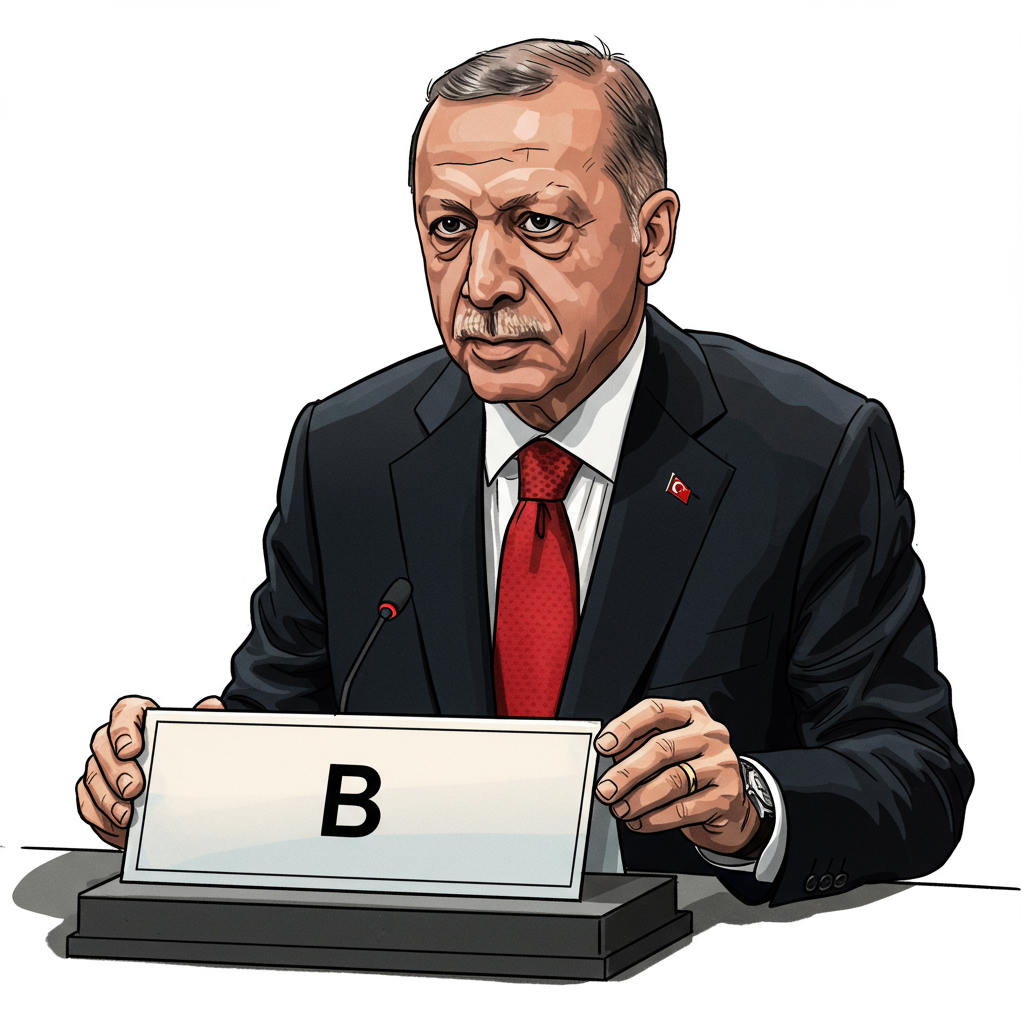A dramatic diplomatic standoff recently unfolded, altering the course of a crucial Middle East Gaza peace summit in Sharm el-Sheikh, Egypt. US President Donald Trump’s last-minute invitation to Israeli Prime Minister Benjamin Netanyahu was abruptly canceled. This extraordinary turn of events was triggered by a stern warning from Turkish President Recep Tayyip Erdoğan, who declared he would not land his plane if Netanyahu attended. The incident underscored the immense complexities of regional diplomacy and the challenging path toward normalization.
This high-stakes maneuver, dubbed a “mid-air power struggle,” emerged as the international community converged on Egypt. The summit, co-chaired by President Trump and his Egyptian counterpart Abdel Fatah al-Sisi, aimed to finalize an agreement to end the war in Gaza and foster regional stability. More than 20 world leaders, including heads of state from the UK, France, Turkey, Italy, Spain, Qatar, and Jordan, were expected to attend this hastily arranged conference.
The Aborted Invitation: A Diplomatic Flashpoint
The initial plan saw an invitation extended to Prime Minister Netanyahu, reportedly accepted, and sealed during a phone call between Trump and Sisi from Israel on a Monday morning. This set the stage for a potentially unprecedented gathering of leaders from diverse geopolitical landscapes. The inclusion of Netanyahu at such a high-profile Gaza peace summit would have signaled a significant step in Trump’s vision for a “new Middle East.”
Trump’s Vision for a Unified Summit
President Trump was a central figure in these efforts. He actively pursued a peace plan, seeing the summit as a pivotal moment. His aspiration was to bring together key regional players, including Israel, to forge a comprehensive agreement. This ambition was part of a broader foreign policy push to reshape alliances and security arrangements in the Middle East. Trump hailed the eventual ceasefire as an “incredible triumph for Israel and the world,” later stating it marked the “historic dawn” of a new era.
Erdoğan’s Unwavering Ultimatum
However, Turkish President Erdoğan’s objections proved insurmountable. From his plane above Egypt, he communicated directly with Sisi, making it clear that his participation was contingent on Netanyahu’s absence. Erdoğan has been a vocal critic of Israel’s actions in Gaza, repeatedly labeling them as “genocide.” For the Turkish leader, sharing a platform or being photographed with Netanyahu would have been domestically catastrophic. Such an image could have eroded his political base and raised serious questions about Ankara’s planned role in the international stabilization force intended for Gaza. Erdoğan’s refusal to compromise directly led to the cancellation of Netanyahu’s invitation.
Beyond the Official Narrative: Unpacking Netanyahu’s Decision
While the official statement from Netanyahu’s office attributed his non-attendance to the event’s proximity to a Jewish holiday, deeper political and legal considerations were at play. This public reasoning served as a convenient diplomatic shield, masking the intricate web of pressures that truly influenced the decision.
Domestic Pressures and Political Survival
Netanyahu faced significant internal opposition to his potential presence at the summit. Figures from the extreme right within his coalition government had reportedly threatened to resign if he participated. These hardline elements staunchly oppose any concessions or diplomatic engagements that might be perceived as legitimizing Palestinian statehood or weakening Israel’s security posture. For Netanyahu, navigating these domestic political threats was paramount, as his government’s stability hinged on maintaining his coalition’s unity. Attending the Gaza peace summit might have risked dissolving his government, a risk he was unwilling to take.
The Shadow of International Legal Scrutiny
Another critical factor was the looming threat of international legal action. Netanyahu faces international criminal court (ICC) arrest warrants for alleged war crimes in Gaza. Although Egypt is not a signatory to the ICC, his presence at an international gathering would have been highly contentious. Many Arab states, particularly those that have not normalized relations with Israel, would have found his attendance deeply problematic. This legal cloud added another layer of complexity, making his diplomatic maneuverability extremely limited and any public appearance fraught with potential controversy.
The Gaza Peace Summit: Context and Critical Outcomes
Despite Netanyahu’s absence, the Gaza peace summit proceeded with significant outcomes. The high-level gathering marked a pivotal moment in the ongoing efforts to resolve the conflict and address the humanitarian crisis in Gaza. The primary objectives were to finalize a ceasefire and initiate plans for post-conflict recovery.
A Landmark Ceasefire and Hostage Exchange
A major achievement of the summit was the signing of a Gaza ceasefire deal. The mediating nations – the US, Qatar, Egypt, and Turkey – played crucial roles in brokering this agreement. This historic truce led to a large-scale exchange of captives, bringing immense relief to thousands. All 20 remaining living Israeli hostages, held by Hamas for over two years, were released and reunited with their jubilant families in Israel. In a parallel move, Israel released over 1,900 Palestinian detainees and prisoners, some returning to emotional crowds in Ramallah, while others were sent to Gaza or deported to neighboring countries. The scale of this exchange underscored the deal’s significance, marking a moment of hope amid prolonged conflict.
Regional Leaders Convene for a New Middle East
With leaders from at least 27 countries present, the Sharm el-Sheikh summit became a forum for envisioning a “new Middle East.” President Trump, fresh from a visit to Israel where he was welcomed by Netanyahu, celebrated the ceasefire as the end of an “age of terror.” The discussions focused on coordinating ceasefire implementation, reconstruction efforts for Gaza, and enhancing regional security. Leaders, including the UN Secretary-General and various prime ministers, signed off on a Middle East peace plan, signaling a collective commitment to long-term stability. While Israel and Hamas were not present at the signing, their actions were central to the discussions.
Lingering Challenges and the Path Ahead
Even with the landmark ceasefire and hostage exchange, significant challenges persist for Gaza and the broader region. The diplomatic incident surrounding Netanyahu’s aborted invitation highlights the deep-seated divisions that complicate the path toward lasting peace and normalization.
Hamas’s Post-Ceasefire Presence
Immediately following the ceasefire, concerns emerged regarding the situation on the ground in Gaza. Hamas began deploying armed fighters and police across parts of the devastated territory, reportedly to reassert authority. There were reports of clashes with local families and threats against “collaborators.” President Trump suggested Hamas was acting within the ceasefire “parameters,” yet this raised serious questions about the disarmament of Hamas – an “ill-defined provision” of the deal. The presence of a proposed new stabilization force of regional troops in Gaza faces formidable obstacles, including how to disarm militant factions and ensure genuine security.
The Delicate Balance of Normalization
The diplomatic row over Netanyahu’s presence vividly demonstrated the difficulties inherent in achieving normalization of relations between Israel and some Muslim-majority countries. For leaders like Erdoğan, domestic political considerations and strong public sentiment regarding the Palestinian issue outweigh the benefits of direct engagement with the Israeli prime minister. Any attempt to broker wider regional peace must navigate these complex interplay of domestic politics, international legal issues, and entrenched geopolitical rivalries. The incident serves as a powerful reminder that despite high-level summits and ceasefire agreements, the journey toward comprehensive and lasting peace in the Middle East remains fraught with delicate diplomatic balances and profound political sensitivities. The estimated death toll of 67,869 Palestinians in Israeli attacks since October 7, 2023, further underscores the urgent need for a durable resolution.
Frequently Asked Questions
Why did Netanyahu not attend the Gaza peace summit in Egypt?
Prime Minister Benjamin Netanyahu’s invitation to the Gaza peace summit was aborted primarily due to Turkish President Recep Tayyip Erdoğan’s ultimatum. Erdoğan threatened to boycott the summit if Netanyahu were present, citing strong objections to Israel’s actions in Gaza. While Netanyahu’s office officially stated his absence was due to a Jewish holiday, underlying factors included threats of resignation from extreme-right members of his coalition government and the contentious nature of his presence given international criminal court arrest warrants issued against him for alleged war crimes.
What were the key outcomes and agreements from the Gaza Peace Summit in Sharm el-Sheikh?
The Gaza Peace Summit, co-chaired by US President Trump and Egyptian President Sisi, resulted in a landmark Gaza ceasefire deal signed by over 20 world leaders. Key outcomes included the release of all 20 remaining living Israeli hostages by Hamas and the concurrent release of over 1,900 Palestinian detainees and prisoners by Israel. The summit also focused on coordinating efforts for Gaza’s reconstruction, enhancing regional stability, and outlining a vision for a “new Middle East,” mediated by the US, Qatar, Egypt, and Turkey.
What are the broader implications of this diplomatic incident for Middle East normalization efforts?
The incident profoundly illustrates the persistent difficulties in normalizing relations between Israel and some Muslim-majority countries. Erdoğan’s firm stance highlighted how domestic political pressures and public sentiment regarding the Israeli-Palestinian conflict can derail high-level diplomatic initiatives. It underscores that any future normalization efforts face significant hurdles, requiring careful navigation of complex national interests, regional rivalries, and international legal considerations, particularly concerning leaders facing accusations of war crimes.




